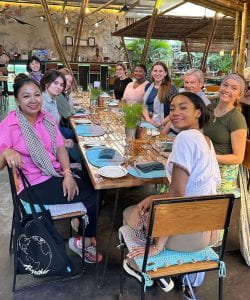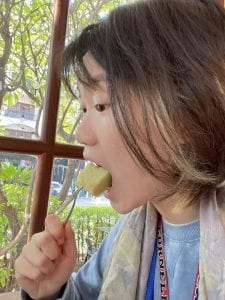 Hi! This is Lucy, a sophomore at Cornell University majoring in Global Development. Today is January 5, 2024, my fourth day in Cambodia. Different from yesterday’s emphasis on historical heritage, today we focused mostly on how laborers and workers are organized in contemporary Cambodia.
Hi! This is Lucy, a sophomore at Cornell University majoring in Global Development. Today is January 5, 2024, my fourth day in Cambodia. Different from yesterday’s emphasis on historical heritage, today we focused mostly on how laborers and workers are organized in contemporary Cambodia.
Our morning journey led us to the American International Center for Solidarity. On the bus, our group engaged in discussions about the role of trade unions in society, drawing from insights gleaned in previous classes or personal experiences. The bus became a forum for diverse thoughts, questions, and a myriad of answers. This open and inclusive learning environment has been one of the most precious features of this trip to Cambodia. And I’m so grateful for being able to be part of this amazing group.
Embark on a journey into the solidarity center, where Mr. Nimol unfolded the rich tapestry of Cambodia’s labor movement history. The unions, diverse in types and political leanings – independent, pro-government, anti-government, and the elusive grey unions – became characters in a plot filled with rising tensions that played out like a gripping drama.
While listening, one idea kept haunting my mind—is it possible to have independent trade unions at all in this politicalized world? Nimol’s intriguing response unveiled the reality dictated by Cambodian laws – all unions must lean towards supporting the government for survival. Professor Fincher chimed in with insights on distinguishing political tendencies from acts under political oppression, providing a unique perspective on organizations navigating government dominance.
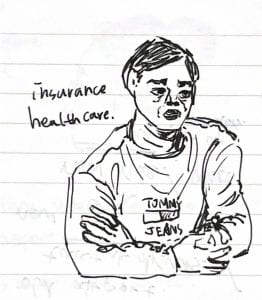 Transitioning to insights from seven union leaders, the spotlight shone on the unexpected challenges faced by local laborers due to a new international airport constructed by a Chinese company. Rare job opportunities, absence of labor unions, and unsecured healthcare for workers unveiled a plot twist that left the Tuktuk drivers sidelined from the roads surrounding the airport, impacting their businesses significantly.
Transitioning to insights from seven union leaders, the spotlight shone on the unexpected challenges faced by local laborers due to a new international airport constructed by a Chinese company. Rare job opportunities, absence of labor unions, and unsecured healthcare for workers unveiled a plot twist that left the Tuktuk drivers sidelined from the roads surrounding the airport, impacting their businesses significantly.
As the narrative unfolded, the stage shifted to the role of tourism and its dance with the impacts of COVID. The local society, once the tourist hotspot, faced a double blow – exploitation of water resources and surging pollution. The COVID era stripped away tourism benefits, leaving behind job losses, deserted airports, and lingering environmental damage. Now, in the post-COVID phase, the challenge remains – how to strike the delicate balance between tourism and preserving local culture and environment sparks a heated debate.
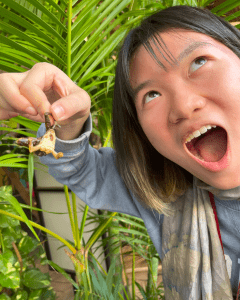 This day is truly memorable also thanks to the exhilarating culinary journey! SPOON social organization curated a feast for us, featuring an array of local delicacies made from insects, frogs, flowers, fruits, and more. Imagine vibrant purple flowers adorning rice noodle soups, crispy fried silkworms, and bananas steamed with sticky rice – a flavor explosion! In picture 1, you’ll catch me playfully imitating a shrieking dried frog. Its taste? Like nibbling on dried fish with just a hint of meat. Then, we had a very wonderful Khmer dinner in the café run by SPOON and served by its students. I’m so fascinated by the great variety of beautiful plants used in the dishes, which keeps me thinking of the Khmer people’s love for life and the plants living together with them on this land.
This day is truly memorable also thanks to the exhilarating culinary journey! SPOON social organization curated a feast for us, featuring an array of local delicacies made from insects, frogs, flowers, fruits, and more. Imagine vibrant purple flowers adorning rice noodle soups, crispy fried silkworms, and bananas steamed with sticky rice – a flavor explosion! In picture 1, you’ll catch me playfully imitating a shrieking dried frog. Its taste? Like nibbling on dried fish with just a hint of meat. Then, we had a very wonderful Khmer dinner in the café run by SPOON and served by its students. I’m so fascinated by the great variety of beautiful plants used in the dishes, which keeps me thinking of the Khmer people’s love for life and the plants living together with them on this land.
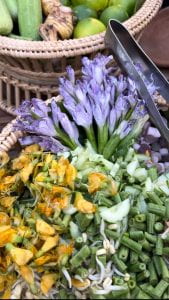 In the end, I want to give my warmest thanks to Professor Fincher and Professor Vanchan for organizing these amazing opportunities for us to learn about Cambodia in such diverse and deep dimensions. It has always been my dream to experience and learn about different cultures and this trip is such a wonderful highlight that will create a profound impact on my future paths. Moreover, the memories built with amazing and powerful women in our group have been so beautiful that I will always save a place for it wherever I go.
In the end, I want to give my warmest thanks to Professor Fincher and Professor Vanchan for organizing these amazing opportunities for us to learn about Cambodia in such diverse and deep dimensions. It has always been my dream to experience and learn about different cultures and this trip is such a wonderful highlight that will create a profound impact on my future paths. Moreover, the memories built with amazing and powerful women in our group have been so beautiful that I will always save a place for it wherever I go.
